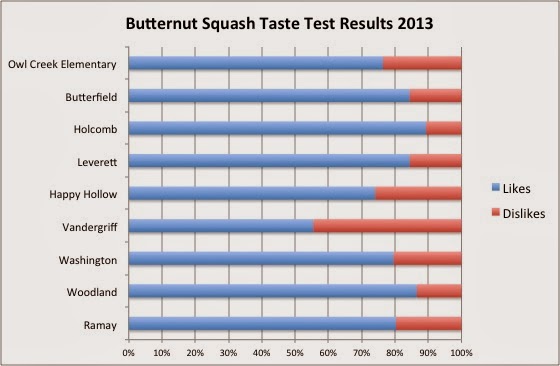Once
we finished the apple taste tests this past fall, it came time for butternut
squash! This was the Fayetteville Public School District’s first time putting
this vegetable on the menu and it was
locally sourced. The students have
already been eating sweet potato fries from a local processing plant, but many
had never heard of this oblong-shaped squash.
Ally
(last year’s FoodCorps service member), now contracted Farm-to-School dietitian,
along with Morgan Stout, our amazing new Food Service Director, decided that
taste tests would be a good way to familiarize the students with this new menu
item and help them decide if they’d want it on their lunch tray.
A
huge part of my service year thus far has involved taste tests and I swear by
them! These butternut taste tests made a large impact as well. One of the
kitchen supervisors reported that the students chose to take 40 lbs. more
squash on the day we had the taste test than they did the previous week. Here is our recipe:
We learn a lot from each tasting we coordinate. There a few pitfalls you should be aware of when planning a butternut tasting:
Dino Hands (seriously)
Always wear gloves if you can! Whatever natural chemical is inside of the butternut squash turns your skin into dinosaur scales all day long.
Frustrated Peeler-Person
Steaming the squash for 5 minutes prior to peeling it (with a vegetable peeler) makes the skin glide off with ease.
Does It Herself FoodCorps Girl
Whenever you want to introduce a new item/recipe INVOLVE the kitchen staff! They can be a wealth of knowledge with tips on how to do things more efficiently and even if they aren’t they are the ones that will be preparing the food in the future so they need to learn the best ways to do it. Plus some of the best memories were from getting to know the kitchen staff, cooking really brings people together. Change is hard and you want to make the transition to a new menu item enjoyable and encouraging for everyone
involved.
We learned some great lessons about presentation as well:
Entice DON’T Pressure
I kept telling kids “You don’t have to try it if you don’t want to,” while also saying “It tastes similar to pumpkin pie or sweet potato fries!”
Mouthful of Syllables
Ally and I joked about how we wish we were serving “beets” or “peas” because that would involve a lot less syllables to offer each lunch-line kiddo. At one of the schools I handed out the samples to a table and shortened it to “Do you want to try some squash?” and then after they ate it I explained to them it was called “roasted butternut squash” and one little boy looked very bewildered with this longer name, he right away asked if there was a rash on his face. I said “No,” and quickly asked him “But why?” and he explained that he had a nut allergy. It took me a minute to register the reason for his worries but then I assured him our butterNUTS didn’t have any nuts in them and he was able to relax. Poor kid!
Positive Peer Influence
Some students would have the most disgusted looks on their faces and walk straight past my sample into the lunch room, they basically acted like I was the sun and was getting in their eyes so they shielded their face from my butternut squash. BUT later after their friends had tried it and raved about it they came back acting like they hadn’t just totally ignored me and I happily gave them a sample.
In the end, most students were big fans of butternut squash:
 |
| We kept the voting quick and simple for the students, and highlighted our local squash farmer, David Dickey! |
These results, as well as observing how kids interact with each other around food, reminds me of how easily kids can be influenced and how parents can play a huge role in what children desire to eat. If parents enjoy certain foods kids catch on and in turn, can be more open to those foods. The same goes for friends. Don’t you wish every kid could have a veggie loving kid around at all times? We're working on it.
- by Kelsie Shearrer














